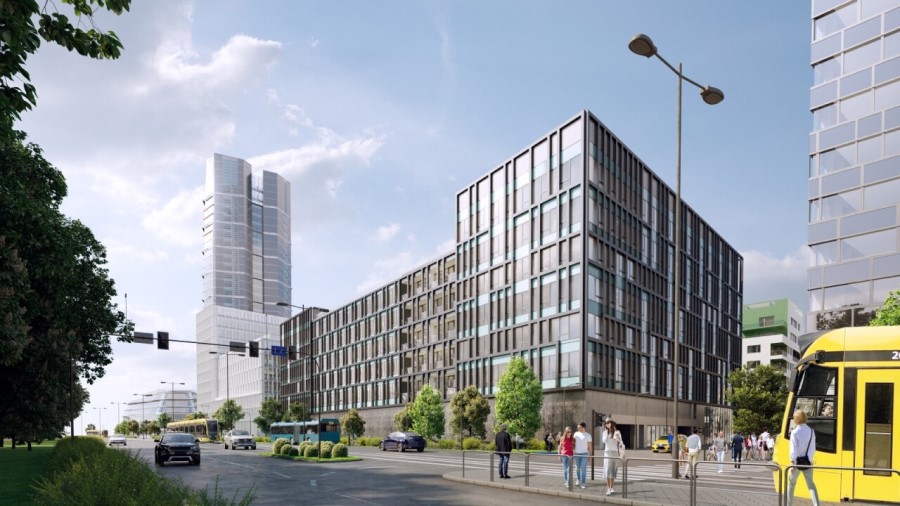Sándor Scheer: Construction companies continued working all through the second wave in Hungary
EnglishMarket Építő Zrt had 170 billion forints sales revenue last year, and expects even better results for this year, Sándor Scheer, founder and CEO of the company told növekedés.hu. He explained that the epidemic did not put construction companies in Hungary into an impossibly difficult position, and they continued working during the second wave. However, the office market is being transformed by the pandemic.
What is the impact of the current wave of the coronavirus epidemic on the Hungarian construction industry? What changes have taken place in the market due to the crisis?
What we can see is that workers who returned home from abroad during the first wave have mostly stayed in Hungary.
Because of the epidemic, they are no longer willing to go and work in Germany or other European countries.
Distributors of building materials have started to reduce their prices, mainly because demand in the European construction industry has fallen by about 5-10 percent. In general, however, it can be stated that the construction industry is one of the sectors that has only been mildly affected by the epidemic, so companies in this sector continued working all through the second wave.
So there were no bankruptcies in the construction industry in Hungary because of the current crisis?
No, not in Hungary.
What are your expectations for Market Építő Zrt this year?
We are starting the year with particularly good prospects. Last year, several of our investment projects had to be rescheduled due to the epidemic and we had to postpone the launch of some projects by several months, but the sales revenue that we lost in 2020 will be mostly realized this year. In addition, as the epidemic subsides, the number of orders will presumably increase, as well.
Therefore, I expect an exceptionally high turnover this year.
 Sándor Scheer, CEO of Market Építő Zrt
Sándor Scheer, CEO of Market Építő Zrt
How much revenue did you have last year?
Market Építő Zrt, instead of the planned turnover of 190 billion forints, realized 170 billion last year. But as I mentioned, the 20 billion that we lost last year is likely to come in this year. We do not yet have accurate data about the whole Market Group, but the sales revenue could have reached around 180-185 billion.
Is it easier or harder to recruit workforce now than before the pandemic?
Last summer, when there was a noticeable increase in unemployment in the sector, professionals were still asking us about potential job opportunities. By now the situation has normalized; and as investment projects kicked off, companies absorbed the available workforce.
How hard is it to comply with the virus control regulations on construction sites?
Last spring it was still a serious problem because a lot of manual workers were sceptical about the virus. Managers at construction sites had to make a tremendous effort to have workers comply with the regulations as they were not willing to wear facemasks and did not bother to keep safe distances. The situation has changed a lot since then. By now, the alarming reports in the media about mortality figures convinced workers that COVID-19 should be taken seriously, so today they are following the rules by themselves without having to be reminded.
 BudaPart City, one of the projects of Market Építő Zrt
BudaPart City, one of the projects of Market Építő Zrt
What impact does the current crisis have on major projects already in progress, such as the construction of the MOL Campus?
The crisis has had no significant impact on these projects. Our foreign suppliers also managed to deliver on time. We have had more administrative tasks, because of the curfew, for example, but we have now adapted to the new situation.
What do you think about the office market? Do you think there will be large office building projects in Budapest in the near future?
There are several companies that have apparently accepted the idea that employees can also work remotely, but that alone will not radically transform the sector. Due to the epidemic, a decline of around 10 percent is expected in the office market. However, there are many companies where it is simply impossible for everyone to work from home.
In the case of the new offices, however, there will be some changes in the setup: office layouts will be different, or access control systems will change. Also hygiene is likely to play a greater role in the design process; for example, more emphasis will be put on the separation of HVAC systems.
What do you think about the state rental housing program? Is it necessary?
In Hungary, at least 20-25 thousand homes have to be built annually so that the housing stock should not depreciate. In my opinion, there is definitely a need for the rental housing program, even if Hungarian people typically want to live in their own property. For the younger age group, however, this is no longer so obvious. Rental housing is also useful because it helps the mobility of the population.
In some people’s view the state has withdrawn from public investment projects as a result of the pandemic. Do you share this view?
I do not know the exact numbers about this, but the situation is similar to private investment projects. There are lots of delays everywhere due to the epidemic, because the preparation of the projects has become more difficult.
